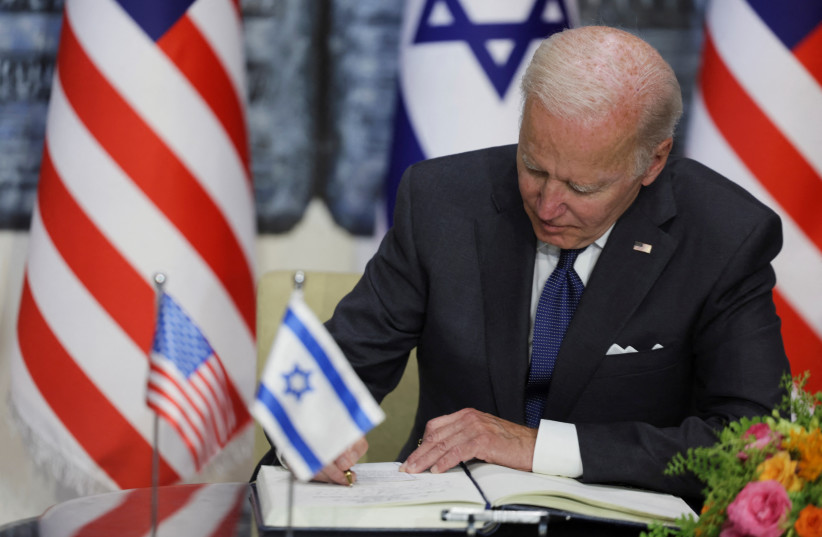In recent years there has been more of a focus on fundamental US foreign policy questions than in the past. These questions relate to what kind of a world we live in and what America’s role in the world will be.
These questions are an attempt to move on from the global war on terror, which was symbolized by involvement in Afghanistan, and look at near-peer rivalries. What that means is shifting from counter-terrorism to confronting China and Russia.
There isn’t really a dispute on whether the US will be confronting Beijing and Moscow: The question rather is what form that confrontation might take. Some have warned of a new “Cold War.” Others have argued, such as in a recent piece at Foreign Policy, that confrontation and great-power wars are coming.
America’s friends and allies are taking notice. Al-Ain media in the UAE wrote up a whole discussion on these recent debates about current times, which marks the end of the post-Cold War era.
Obviously, countries like some in the Gulf – where the US has bases in Bahrain, Qatar and the UAE – care deeply about the US security role. The fact that Iranian ships tried to seize two American naval drones in the last week illustrates how Tehran is trying to humiliate Washington.

What this means is that countries are increasingly reading American media to try to understand what Americans are thinking. Understanding the debate is important because the US is heading for mid-term elections.
President Joe Biden gave a controversial speech on Thursday night slamming the Republican Party as being extremists. It is clear that the US is heading into an increasingly partisan era, after having suffered the trauma of the divisive policies of the Trump years.
This means that whatever Biden and his team propose in foreign policy terms will likely be met with disdain across the aisle. We’ve already seen how US foreign policy has become domestic policy, meaning that issues of how to approach Iran or Russia tend to play themselves out on the local level.
Support for Israel or ties to Saudi Arabia and Qatar are all up for debate at the domestic level. Think tanks in Washington are highly partisan, sometimes being paid by foreign governments to push alliances with foreign powers. Countries like Turkey seek to buy support and influence the US. Sometimes the funding is opaque, but it is clear that foreign governments are seeking influence.
Beyond these lobbying efforts, there are also deep divisions in the US. An article at CATO Institute asks “Risking Los Angeles for Taipei: Is Taiwan worth a destructive Pacific war that could reach the US homeland?”
Other magazines and think pieces slam Ukraine and claim that American support for Kyiv is harming the US domestically. That means there is no real consensus on even simple things like backing South Korea, Japan and Taiwan, disputes which aren’t entirely new.
In the 1950s and ‘60s, there was a lot of discussion on the far Right in the US about “communists” infiltrating the government and “losing” China. Later, there were shifts regarding which party was closer to Israel. But overall, US foreign policy has had broad strokes in the 20th century.
US Foreign Policy
Now some policies that appear isolationist are coming back to the foreground. In addition, there is a stable of “realist” policymakers who seek to argue that the US should appease Russia, China and Iran. So across the political spectrum from far Left to far Right, there is a greater discussion today about America’s role in the world than there was in the recent past.
Most people are aware that the US went through some transition from the end of the Cold War to discussing its role as a “global policeman” or practicing “humanitarian intervention” and “preemption.” It’s clear that the reticence of the Obama administration to continue America’s traditional role in the Middle East – coupled with the Trump administration’s willingness to radically shift some American policies – altered how countries view the US.
All of this now resounds in how countries in the Gulf or Asia view the American approach. Some countries desperately want US support and are asking American arms manufacturers to speed up production of weapons. Other countries are weighing what might come next, hedging on conflicts like Ukraine and not taking sides.
Some nations are falling into chaos, like Iraq – and the US has no clear policy about what to do. This shift – as the US tries to figure out how it will confront Russia and China – is of the utmost importance to US partners and allies.
However, the possible domestic chaos, watching the reactions to Biden’s recent speech, also leaves countries wondering whether America can carry through with robust foreign policy decisions if it is facing domestic factionalism and extremism.
Countries will watch carefully as the US careens toward mid-term elections. The tendency toward isolationism by some on the far Right means that America’s partners and allies may be concerned.
On the other hand, those who value a traditional US role may wonder whether Washington can fully undertake to confront Russia and China when countries such as Iran and Turkey are all looking to challenge America in various ways.
